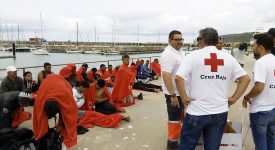The European Union proposed doubling the size of its Mediterranean search and rescue operations. This move comes as the first approximately 900 bodies from the deadliest recorded shipwreck of migrants, who were trying to reach Europe from the north coast of Africa, were brought ashore. The mass deaths from the Sunday’s disaster off the coast of Libya when a large boat capsized have sent shock waves around the European Union that made the decided last year to reduce naval operations, which now actually appears to have missed the main objective: to discourage the migrants from undertaking the perilous journey across the Mediterranean. In fact, the opposite scenario is now taking place: the numbers of migrants willing to board the overloaded boats seem to have actually increased.
While several rescue operations were underway on Monday and Tuesday to save hundreds more migrants on overloaded ships, European Council President, Donald Tusk, describing the situation in the Mediterranean as “dramatic”, called an extraordinary summit of EU leaders for Thursday aiming to devise a plan to stop human traffickers and enhance rescue efforts. EU Commission has presented a plan to deal with the mounting crisis, which would include doubling the size and the funding of “Triton”, as the EU naval operation in the Mediterranean is called. The latest disaster has seen the highest death toll in recent years among tens of thousands of migrants that are trafficked in rickety boats across the rough seas of the Mediterranean. The captain of the migrant boat and his deputy had reportedly been arrested on suspicion of people smuggling.
Meanwhile, Italian Prime Minister, Matteo Renzi, compared the smuggling of migrants across the Mediterranean to “slavery” centuries ago. Following a similar large-scale disaster off Lampedusa in 2013, prosecutors in Palermo announced yesterday (20 April) that they had arrested 24 suspected traffickers who are believed to be implicated in organizing the transport of thousands of Ethiopians and Eritreans to Italy. European officials have been trying to develop a strategy to respond more humanely to the exodus of migrants undertaking a perilous journey by sea from war-torn regions of Africa to Europe, without worsening the crisis by encouraging more to leave. The dilemma they are facing is clear: By organizing search and rescue operations, criminals who get the refugees on board may be effectively encouraged to send more boats. Despite obvious challenges, German Chancellor Angela Merkel was today quoted as saying that Europe should “do everything to prevent further victims from perishing in the most agonizing way on our doorstep.”







